Sustainability
History of Our Social and Environmental Activities
-
-
1979
-
Start of the Come Back Salmon Campaign
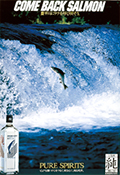
Takara Shuzo launched the Come Back Salmon Campaign with the sale of a Hokkaido-only version of Takara Shochu Jun in a special commemorative bottle. A part of the sales of this product were donated to the Sapporo Sake-no-Kai together with funds collected at donation boxes throughout Hokkaido, as this initiative turned into a community-based public relations activity.
-

1982
-
Start of the Protect Japan’s Pine Trees Campaign
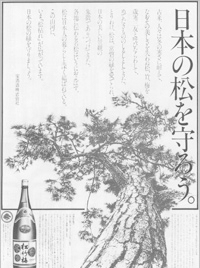
Takara began the Protect Japan’s Pine Trees Campaign in support of the Nihonno-Matsu-no-Midori-wo-Mamoru-Kai (“Protect Japan’s Pine Trees Organization”).
A part of the sales from Sho Chiku Bai sake with labels bearing the campaign’s slogan was donated. This was a nationwide effort to raise awareness about the need to protect and nurture Japan's pine trees, which were at risk of being wiped out by damage caused by environmental pollution and pine weevils. -

1983
-
Start of the Protect Japan’s Bamboo Trees Campaign
Takara provided support for the Nihon-no-Take-wo-Mamoru-Kai (“Protect Japan’s Bamboo Trees Organization”), which was started by a group led by Soshitsu Sen, grand master of the Urasenke School of the Japanese tea ceremony, launching the Protect Japan’s Bamboo Trees Campaign.
1984
-
Start of the No Alcohol Until You Are Twenty corporate advertising campaign
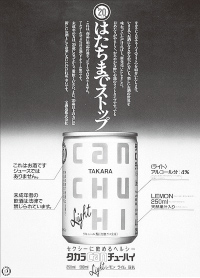
This corporate advertising campaign gained attention nationwide as the industry’s first example of a straightforward effort to address the issue of underage drinking.
Timed to coincide with the November issuance of new paper currency with the portraits of Soseki Natsume and Yukichi Fukuzawa, Takara launched a series of posters featuring pun-like copy based on the titles of their literary works. -

1985
-
A corporate philosophy seeking harmony between nature, society, and individuals
To commemorate the 60th anniversary of the founding of Takara, a new corporate philosophy was adopted, stating Takara’s intent to contribute to the creation of a vital society and a healthy lifestyle through our fermentation technology and biotechnology in a way that achieves harmony with nature. The corporate philosophy was most recently revised in 2001.
-
The Takara Harmonist Fund charitable trust
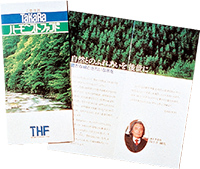
Having recognized the importance of environmental activities through initiatives like the Come Back Salmon Campaign, Takara resolved to create a charitable trust.
Takara Harmonist Fund -

-
The Say No! Campaign
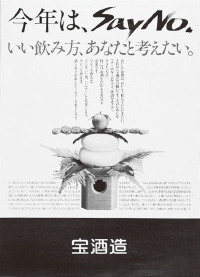
Takara launched a new corporate advertising program to encourage people to drink responsibly and turn down alcohol in situations where they shouldn’t drink.The slogan was “This year, say no!”
-

-
A pamphlet to encourage responsible drinking: The Say No! Reader
This pamphlet was issued to encourage a proper understanding of alcohol and responsible drinking. In 1995, the title “Say No! Reader” was changed to “Say No! Press.”
1989
-
Sports drink PADI features Japan’s first stay-on tab
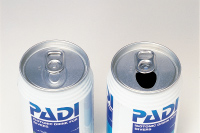
Takara launched Japan’s first canned beverage with a stay-on tab, contributing an immediate solution to the problems caused by pull-tabs. Thereafter, the stay-on tab quickly became the standard means of opening Takara Can Chu-Hi and other canned products throughout Japan.
-

1991
-
The 1st Takara Clean Can Walking event
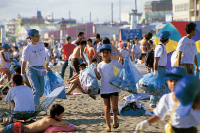
The "TaKaRa Clean Can Walking" event was held from 1991 as a citizen-participation environmental volunteer event. Local volunteer groups, general consumers, people involved in distribution, and Takara Shuzo employees worked together to collect empty cans and garbage. In addition, since 1992, the "Chikyu Pika-Pika Daisakusen" campaign ("Clean Earth Campaign") was carried out under the leadership of the company's labor union at business sites nationwide.
-

1992
-
The 1st Takara Great Outdoors Adventure
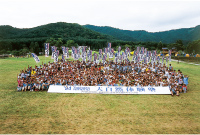
This event was held at Youteizan Nature Park, campsites in the Tomakomai area, the Minamifurano Kanayama Lakeside Campsite, and other sites throughout Hokkaido, where children could come in contact with the great outdoors on a two-day, one-night adventure that included field seminars, cooking outdoors, canoeing, and other activities.
The fees for participating in this event were donated to the Hokkaido Shimbunsha Yasei Seibutsu Kikin (“Hokkaido Newspaper Wild Animal Fund”) and used to help preserve Hokkaido’s nature areas. -

1994
-
In Hokkaido, first use of returnable bottles for Takara Shochu Jun and Jun Legend
Start of return of 720-ml bottles. For the first time in 17 years, a new design was applied for Takara Shochu Jun bottles.
-
Start of the Hokkaido Firefly Project
In conjunction with the relaunch of Takara Shochu Jun in returnable bottles, the "Hokkaido Firefly Project" supporting the "Firefly Friends Hokkaido Campaign" run by the Hokkaido Shimbun newspaper was launched.
As part of the Hokkaido Firefly Project, a portion of the proceeds from sales of the new returnable bottle version of Takara Shochu Jun was donated to the project under the slogan "Fireflies teach us about JUN nature" ("JUN" being the Japanese word for "pure"). Further, a wide range of activities, including the provision of information on the environment where fireflies live and activity-type classes for observing fireflies in flight, were conducted. -
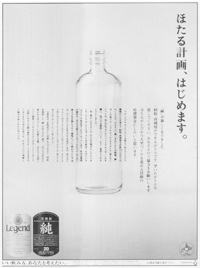
-
Start of the Protect the Clear Waters of the Shimanto River Campaign
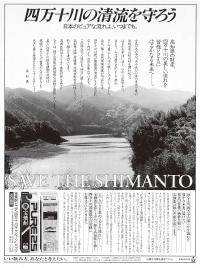
The Shimanto River had been called Japan’s last remaining unpolluted river, and Takara contributed to keeping it that way by proposing to Kochi Prefecture to support preservation activities with a part of its sales. This led to the creation of the Shimanto River Fund.
In cooperation with Kochi Prefecture, we conducted also a public relations campaign to raise awareness about the importance of protecting the Shimanto River. -

1995
-
Dispatch of volunteers to provide support in the aftermath of the Great Hanshin-Awaji Earthquake
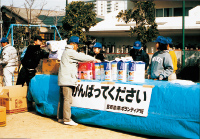
Establishing a special unit to coordinate Takara’s response, donations and volunteers were sent to provide support.
-

-
Takara products labeled “alcohol”in braille
As part of its efforts to help people avoid mistakenly imbibing alcohol, for the first time in Japan, Takara began to label the tops of Takara Can Chu-Hi with the word “alcohol” in braille. Also, in 2002, this relief was added for the first time in Japan to the plastic caps of paper cartons containing alcohol.
1997
-
Start of Eco-Challenge 21, a companywide environmental initiative
The Eco-Challenge 21 initiative was created to tackle two major issues: environmental issues arising within planning for production facilities and tracking what happens to the empty containers left when Takara products have been consumed.
1998
-
Start of recycling of waste liquid from shochu distillation at the Takanabe Plant (currently Kurokabegura) for use in the manufacture of cement
Takara installed equipment for recycling waste liquid from shochu distillation as raw material for cement.
-
Development of Eco-PET
Takara developed a PET plastic bottle, called Eco-PET, which conforms to the voluntary design guidelines for Class II designation PET bottles.
-
Start of sales of shochu by measure
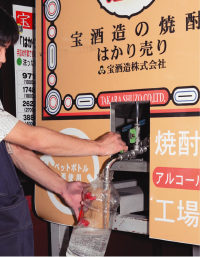
We started promoting sales by measure as a sales method that can save resources and reduce waste with a little effort.
environmentally conscious product packages and simplify packaging sales of shochu by measure -

-
The environmental report “Green Ink Accounting Report”is issued
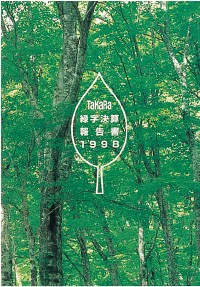
Takara begins publishing an accounting report that shows not just profits and losses (black and red ink) but also a new “eco” index in green ink, indicating the effects of environmental initiatives.
-

1999
-
Adoption of removable caps
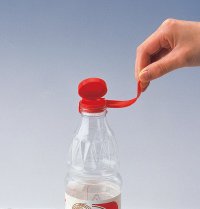
Although the caps of PET plastic bottles were not originally sortable, Takara Hon-Mirin is Takara’s first seasoning product with a removable cap that allows PET andnon-PET refuse to be sorted easily.
-

-
Introduction of the ISO 14001 environmental management system
-
Yujiro Ishihara Memorial Box goes on sale
Proceeds from sales are donated to Marine Rescue Japan and the Japan Marine Recreation Association.
-
Establishment of a corporate policy for environmental activities
Takara established a corporate policy for environmental activities, calling for efforts to reduce the burden on the global environment that accompanies production activities. The policy also encourages efforts to contribute to community-based nature preservation activities as a means of returning to society the profits earned through corporate activities.
2000
-
Received “Chikyu Kankyo Forum Excellence in Business” in the Global Environment Awards
-
Received an Award for Excellence in the Toyo Keizai Inc. Green Reporting Forum Environmental Report Awards
2001
-
Earth Day Tokyo 2001
Takara participated in Earth Day Tokyo 2001 in April sharing information with NGOs and the local community about eco-products and other activities.
-
Industry’s first in-house natural gas refilling station installed at the Fushimi Plant

With the conversion of our forklift fleet to natural-gas-powered motors, a naturalgas refilling station was built at the Fushimi Plant.
-

2002
-
Cosponsoring Velotaxi
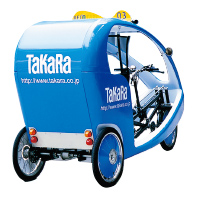
Takara supports the Environmental NPO Kankyo Kyosei Toshi Suishin Kyokai (now Velotaxi Japan) in its efforts to promote the eco-friendly bicycle-based Velotaxi.
-

2003
-
Takara Organic Hon-Mirin conforms with Type III Environmental Declarations requirements
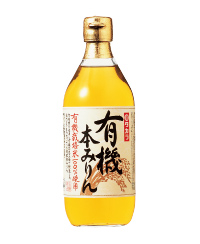
Takara adopted the Type III Environmental Declarations standard in order to provide consumers with the information they need to select products with a low environmental burden. Takara Organic Hon-Mirin became the first food product worldwide to adopt labels that conform to the requirements of EPD Type III Environmental Declarations.
-

-
Takara Shuzo acquires companywide ISO 14001 certification for its headquarters, business offices, and production facilities
2004
-
Establishment of a compliance committee and compliance promotion office
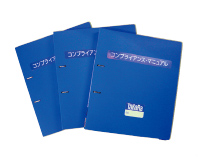
Takara established an organization for strengthening its legal and business ethics compliance, and crisis management.
-

-
Takara publishes the Recycle Road environmental training text
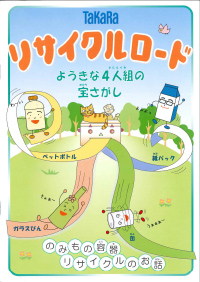
Takara compiled, in cooperation with the environmental NPO Japan Environment Club, a manga-style textbook with easy-to-understand explanations of beverage makers’ social responsibility to ensure the recycling of product packaging. The text was distributed upon request to elementary and junior high schools throughout Japan.
-

-
Opening of the Takara School of Rice and Sake
In cooperation with the environmental NPO School of Forest, Takara established the Takara School of Rice and Sake for children who have reached elementary school age and their parents. The school holds four events a year to provide opportunities to experience farming, observe the natural environment, and study the rules of responsible drinking. The school’s goal is to enhance understanding of environmental issues and social norms.
-
Cautions about drinking alcohol while pregnant
Takara began to add cautionary content against drinking alcohol while pregnant to its alcohol products.
-
Comprehensive acquisition of ISO 14001 certification at 17 business sites
2005
-
The CSR report “Green Ink Corporate Report”is issued
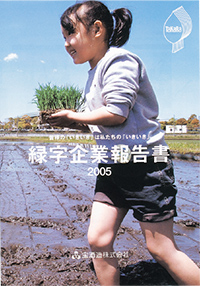
Takara issued a new Green Ink Corporate Report, which adds elements of corporate social responsibility to the content previously issued under the title Green Ink Accounting Report.
-

2008
-
Opening of Takara Shuzo Farm School
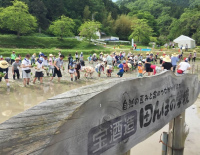
The Takara Shuzo Farm School was launched as an updated version of the Takara School of Rice and Sake run from 2004.
-

-
Inaugural Takara Shuzo Cup Go Championships
Takara teams up with the Nihon Ki-in to hold an event designed to promote enjoyment of the game go and sake, in which people compete to win the Takara Shuzo Cup.
2009
-
The Drinking Responsibly Reader
This reader was issued to promote a proper understanding of alcohol and responsible drinking and entailed a full-fledged revision of the original “Say No! Press” pamphlet into the “Drinking Responsibly Reader.”
2011
-
Providing drinking water to the victims of the 2011 Great East Japan Earthquake
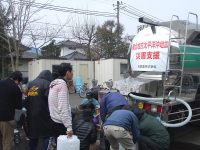
Two 10-tonne tank trucks were employed to provide drinking water to the residents of Sendai and Kesennuma in Miyagi.
-

-
Sho Chiku Bai Ten begins sales in convenient pouches
-
Takara Shuzo Farm School is recognized with a special award from the Corporate Philanthropy Awards
2012
-
Opening of Takara Shuzo Eco-School

The Takara Shuzo Eco-School opens, offering a hands-on program where children and their parents can learn about environmental issues related to refuse and its disposal.
-

2013
-
Cosponsoring Japan’s first domestically developed Velotaxi
Takara cosponsored the development of a Japanese-built Velotaxi designed specifically for use on Japanese roads.
2014
-
Takara Shuzo Farm School is awarded a Review Committee’s Special Prize by the Ministry of Education, Culture, Sports, Science and Technology’s Award for Corporate Sponsorship of Youth Activities
-
Takara donates land used for emergency housing to the City of Shirakawa in Fukushima
In June 2011, Takara loaned land on the site of the former Shirakawa Plant to the City of Shirakawa for use as the site of emergency housing for victims of the earthquake and tsunami. This land has since been donated to the City of Shirakawa for use by the local community.
-
Takara receives the Prime Minister’s Award at the Awards for Distinguished Services in Promoting the 3 R’s
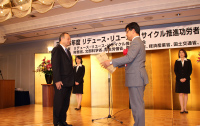
In recognition of its long-term efforts to promote solutions for the recycling of empty bottles, Takara received the Prime Minister’s Award.
-

2016
-
Donation for the Kumamoto Earthquake. Support of water supply in affected areas
2018
-
Donation for torrential rains in July 2018
-
Donation for the Hokkaido Eastern Iburi Earthquake
-
Winning of Grand Prize (highest award) at Eco Mark Award 2018
-
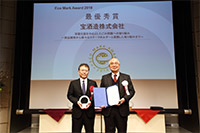

2019
-
Donation for the 2019 East Japan Typhoon
2020
-
「Takara Group Sustainability Policy」 established.
Takara Group has established the Takara Group Sustainability Policy to realize a sustainable society.
-
Donation for the reconstruction of Shuri Castle

To support the rebuilding of Shuri Castle, a World Heritage Site in Okinawa Prefecture that was largely destroyed by fire, Takara Shuzo donated a portion of the sales of its products in the Okinawa and Kyushu areas to Okinawa Prefecture.
-

2022
-
Donation for humanitarian assistance in Ukraine
We donated to the United Nations World Food Program (WFP) Association (United Nations WFP Association), which operates for civilians fleeing conflict in Ukraine and neighboring countries.
-
Disclosures based on the TCFD Framework
2023
-
Scope 3 calculation for Takara Holdings and Takara Shuzo
In addition to Scope 1 and 2, which were previously calculated for Takara Holdings and Takara Shuzo, Scope 3 was also calculated and third-party certification was obtained in January 2024.
2024
-
Donation for the Noto Peninsula Earthquake
-
-

